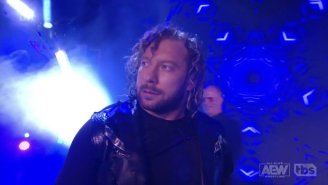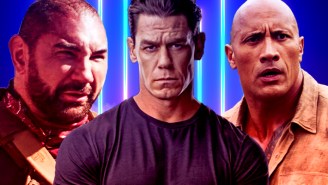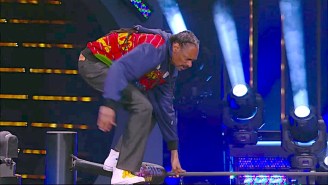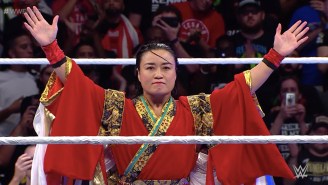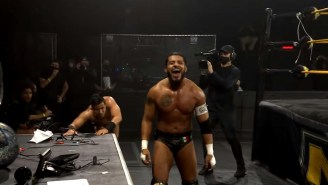It might be hard to believe now that we’re all eagerly anticipating Once In A Lifetime 2: Rest Hold Boogaloo, but there was a time not that long ago when John Cena’s character was really good. It was 2011, and in the stretch between Money in the Bank and Extreme Rules 2012, WWE put a lot of effort into redefining his character into someone the audience could actually get behind, rather than just telling us he was a good guy and leaving it at that.
I’ve written about this before elsewhere, but the Cliffs Notes version is that Cena, as the homegrown embodiment of the WWE, was pit against enemies that were able to turn his status as the golden boy face of the company into something that needed defending, rather than the reason his endless string of wins are so tiresome. CM Punk, with his “pipebomb” threats of taking the WWE Championship to All Japan or Ring Of Honor, was played as an outsider, the indie wrestler who was trying to destroy the WWE despite the fact that, you know, he’d been working there for six years at the time. The Rock was essentially the Ghost of WrestleMania Past, a challenge to today’s top guy from the top guy in a time when pro wrestling was at the height of its popularity. Brock Lesnar was touted (and Tout™-ed) as bringing “legitimacy” back to WWE, reflecting the battle for demographics between pro wrestling and MMA. Cena’s struggles against those three opponents, the losses and victories he went through and the way they all went down, rebuilt his character into something that worked better than it had in years.
And then there was Kane.
Cena and Kane’s bizarre little feud at the start of 2012 felt like a holding pattern that was necessitated more by the Rock being too busy doing press for Journey 2 The Mysterious Island to show up on Raw for a proper buildup. It was a speed bump on the way to the important stuff, just another John Cena vs. A Bad Guy fight that was only really made notable by a bit where Zack Ryder tried to escape Kane by leaving an episode of Raw and having to struggle with a flat tire in what felt like real time, ten feet away from A BRIGHTLY LIT ARENA FULL OF PEOPLE AND SECURITY GUARDS, and then getting thrown off a loading dock and having to spend a month as a bro’d up Stephen Hawking.
Seriously, that was unquestionably the highlight of that angle. I’m pretty happy with virtually anything that treats Kane like a horror movie monster, even — and especially — when it’s at a ludicrous, hilarious extreme. Plus, that one episode pretty much justified Eve turning on Ryder all by itself. Son, you are 27 years old. Learn to change a tire.
Other than that, it was entirely forgettable. Kane said some stuff about wanting Cena to turn on his t-shirt slogan and “embrace the hate,” but nothing about it really made sense. Kane was just generically evil, and the driving force of the story was that Cena and Ryder were suddenly best friends. Maybe I missed some X-Men-esque revelation somewhere that Cena was actually the Third Major Brother, but it always rang false. It filled two months of television, and didn’t even do that very well.
But when you obsess about John Cena storylines for a year and a half, things start to fall into place. When you look at the Cena/Kane feud as part of that larger story, as the bridge between teaming with the rock at Survivor Series and facing him at WrestleMania, you start to realize what it was supposed to be. And once you’ve done that, you can see that it’s actually built around a really smart idea.
The key to it is figuring out Kane’s motivation. Part of it, the only part that was ever really mentioned onscreen, is just the simple fact that Kane’s a bad guy. His feud with Cena came hot on the heels of a return after a few months off that saw him going back under a mask. In fact, he ended up showing up with two masks, taking off one to reveal the other, along with some extensions that weren’t fooling anybody.
This is another thing that I had to take a while to come to terms with, but the more I think about it, the more I like it . Ever since Kane showed up, the commentators have referred to him as a monster and a demon, and in the mythology of the WWE, that’s exactly what he is. He’s pure evil, but when he unmasked in 2003, one of the things that was evident just from looking at him was that there was a person under there somewhere. He had a face. He wasn’t some weird burned monstrosity, he was just a dude, albeit a big dude who would occasional Tombstone Lita and shove Paul Bearer into a meat locker.
The whole thing where he came to the ring wearing two masks seemed dumb at first glance — and, if we’re honest, most subsequent glances — but the symbolism behind it is actually pretty great. After years of seeing a Kane without a mask who went back and forth between a sympathetic good guy and a monster with a tragic backstory, we had a Kane who took off a mask to reveal that underneath it all, he really was that demon we used to be afraid of. The mask is the real Kane. He’s pure evil, and if that’s the case, then corrupting the ultimate good guy is its own reward. He is, after all, the personification of damnation, death’s scarier brother.
The problem is that all of that still leaves the question of why he was involved in what was essentially a story about John Cena fighting the Rock. The stated reason was that he wanted Cena to embrace the hate because he couldn’t beat the Rock, but again, that doesn’t really make any sense. With the recent exception of CM Punk, we’ve seen Cena-the-Good-Guy beat just about everybody there was to beat, so at that point, there was no real reason to believe that he couldn’t beat the Rock, even if it required him to pull out some heretofore unknown sixth move. But there’s another aspect to Kane’s character that makes it fit a little better.
One of the things that always surprises me when I think about Kane is that he’s been around for fifteen years. If you count the guy under the mask and other gimmicks, it’s been even longer, but Kane as a character is one of the last men standing from the Attitude Era — or at least, the last one who’s still on the regular roster and was never a biker who came out to a Kid Rock song. Guys like Triple H and Mark Henry hold that distinction too, but while they’ve gone through different characters over the years (the Hall of Pain is a long way from Sexual Chocolate fathering a hand), Kane’s been Kane for over a decade. Even the funny Team Hell No version that we have now still operates on the principle that all of that stuff he’s done actually happened, long after people stopped thinking of Hunter Hearst Helmsley as a Connecticut blueblood (which was shortly before he actually became one).
Point being, Kane’s been around for a long time. He was around when the Rock had his meteoric rise to fame — his debut was only six months after “The Blue Chipper” Rocky Maivia started referring to himself in the third person — and he would’ve seen it all. He’d know how the Rock only reached that higher level when he started feeding off those “Rocky Sucks” chants that were so popular in 1997 and turned heel, and in that feud with CM Punk, when those “Cena Sucks” chants got so loud that WWE was making t-shirts about them, it’s not hard to think that he’d have a sense of deja vu about the whole thing.
But as someone who’s been around that long, Kane would also have a pretty vested interest in the WWE as it is now, as the thing that had been his livelihood and, to a lesser extent, as the corporation that set things on fire whenever he moved his arms and allowed him to throw Zack Ryder off of loading docks without any kind of repercussion. He’d want to preserve his territory, and since John Cena is the WWE — a fact that’s been readily apparent for the past decade — that means defending John Cena.
That’s why Kane wanted John Cena to turn heel. It wasn’t that Glenn Jacobs was sitting at home watching Raw and reading dirtsheets for those five months he was off and stumbled on a really convincing comment section, it’s that for Kane as a character, that’s how you win. You win by feeding on anger and hate and all that other Dark Side stuff, a theory that’s backed up not just by Kane’s career but by the Rock’s. Seeing the Rock coming back and being wholeheartedly embraced by the fans would’ve been a sign of weakness to Kane, an opportunity Cena could take if he would just nurture that dark side. That same noble streak that drove him to stop Vince McMahon and John Laurinaitis from interfering was what cost him the match with Punk at Money In The Bank and allowed someone to leave the WWE with their championship. It’s the fundamental weak point of his biggest loss.
That’s how that angle was supposed to go. It was supposed to be Kane presenting Cena with the knowledge that the only way to beat the Rock was to do what the Rock did. He had to push Cena to the breaking point, to make him betray his principles, to force him to compromise that three-word caricature of morality that Cena wears on his t-shirt. And Cena, as the hero, as the unshakable core of WWE, would’ve had to refuse, to hold true to what he believed in, even if it cost him something. And when WrestleMania rolled around and he failed to beat the Rock, Kane would’ve been right. Cena would’ve lost, but we’d know that he had the moral victory to continue.
That would’ve been amazing. It’s easy to reassemble the same parts of that angle into something that would’ve worked beautifully along those lines, still allowing Kane to be that goofy horror movie monster, but with a sinister core that would eventually be proven right. You can see elements of that story in what they did.
So does knowing that make the angle any better? No.
Knowing what something was supposed to be (or at least, what it could’ve been) doesn’t change what it was, and the fact of the matter is that this thing stunk up TV for two months. Yes, we got Kane as the ersatz Michael Meyers, stalking Zack Ryder through well-lit areas populated entirely by cameramen, but that was about the end of it. There was never a choice for Cena to make and he ended up just beating Kane like he beats everyone, just with a goofy stipulation that proved that match order is important; Kane was sent to Anger Management and became half of one of the most entertaining things about 2012; and Zack Ryder led an arena in slut-shaming a woman, thereby evaporating any goodwill he’d earned with a pretty personable Art of Wrestling interview. Which is fine, I guess, since it didn’t stop the Punk-Rock-Lesnar arc from being a pretty solid story.
Of course, as soon as he was done proving a triumph of his internal morality in a match against Brock Lesnar, Cena did his level best to physically humiliate a retired wrestler and then enlisted five people to help him beat the Big Show, because WWE only remembers how good guys work about half the time.
That’s what’s so frustrating, and why I end up thinking about these things for a year and a half after they happen: There’s so much potential there, and so much that’s almost great. Sometimes they hit it, and sometimes they come just close enough to fail.
Sometimes it’s John Cena in 2011. Sometimes it’s John Cena in 2012.

